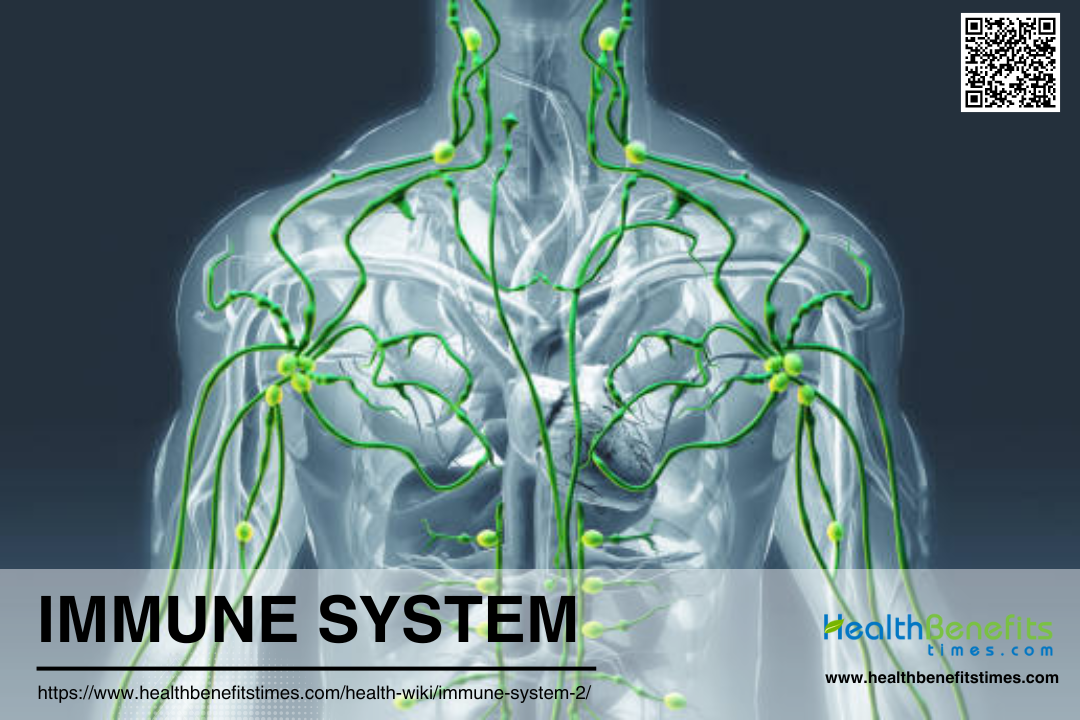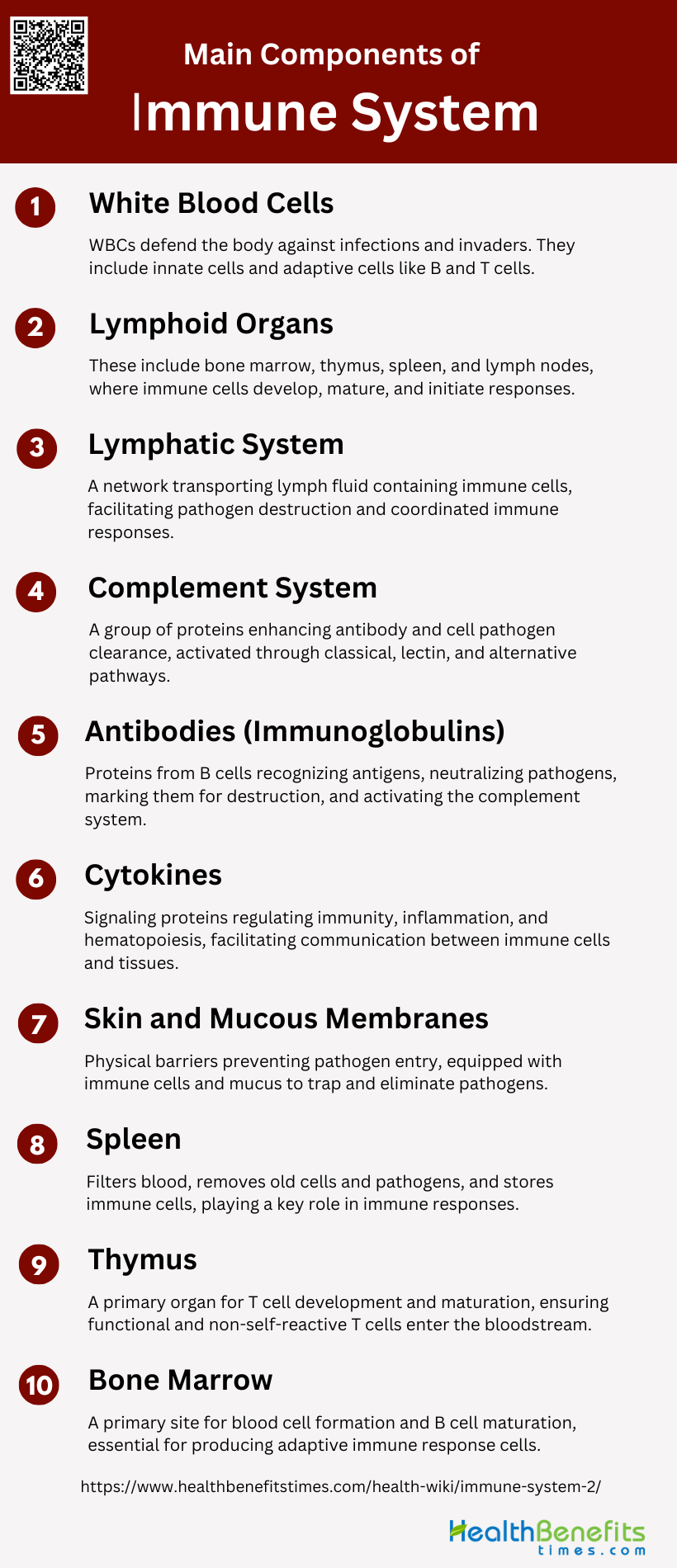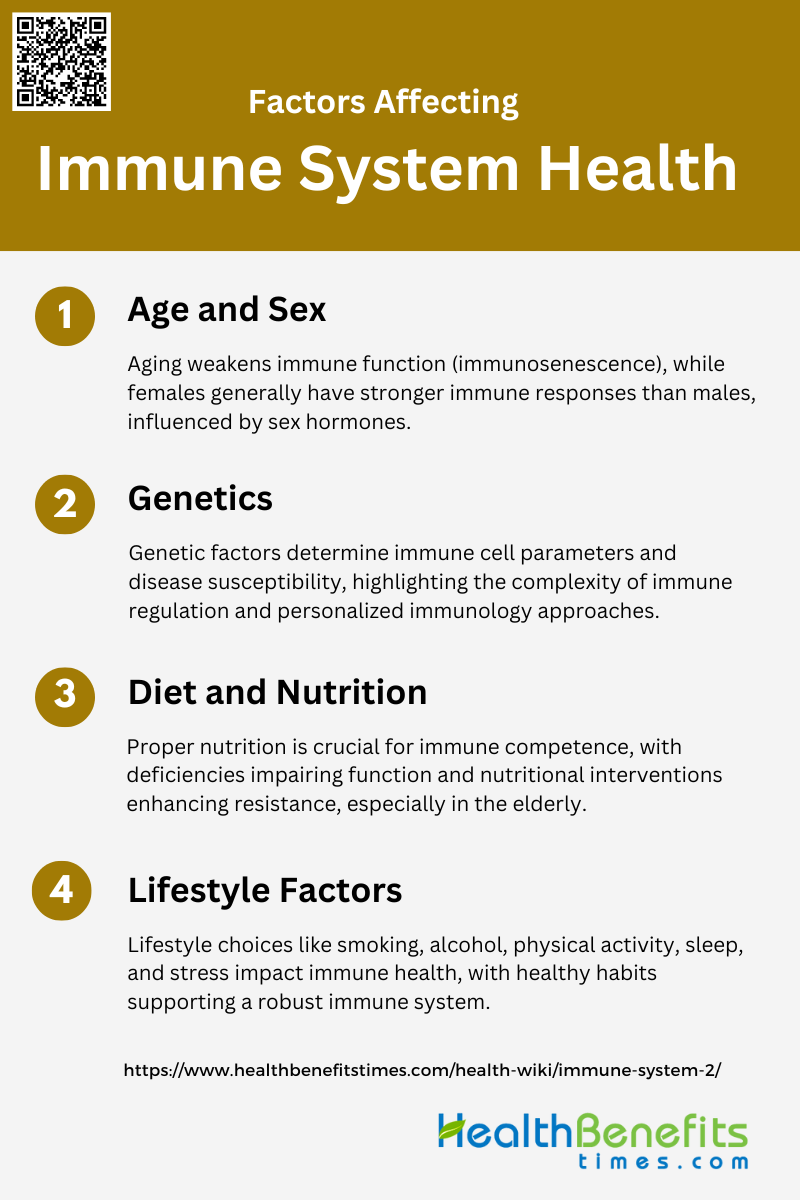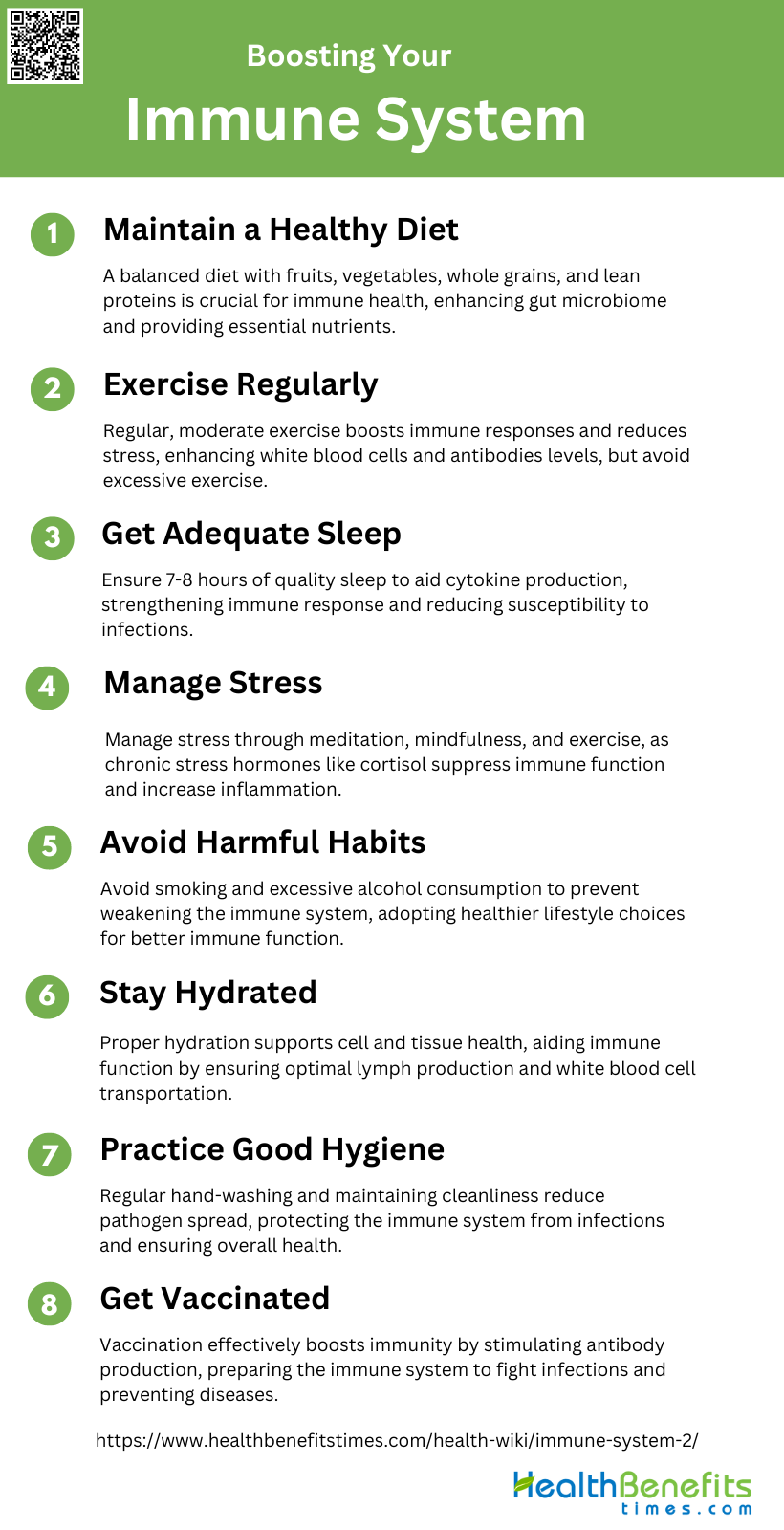The immune system is the body’s complex network of cells, tissues, and organs that work together to defend against harmful pathogens, such as bacteria, viruses, and other microorganisms. This sophisticated biological defense mechanism identifies and eliminates potential threats, helping to maintain overall health and prevent disease. The immune system consists of two main components: the innate immune system, which provides a quick, non-specific response to invaders, and the adaptive immune system, which develops targeted defenses against specific pathogens over time. Key players in the immune system include white blood cells, antibodies, and the lymphatic system. Through a series of intricate processes, including inflammation, phagocytosis, and the production of antibodies, the immune system continually works to protect the body from infection and maintain homeostasis.
Main Components of Immune system
The immune system is a complex network of cells, tissues, and organs that work together to defend the body against harmful invaders. It plays a crucial role in maintaining health by identifying and neutralizing pathogens like bacteria, viruses, and other foreign substances. Understanding the main components of the immune system is essential for comprehending how the body protects itself from infections and diseases.
1. White Blood Cells
White blood cells (WBCs) are crucial components of the immune system, responsible for defending the body against infections and foreign invaders. They are categorized into two main types: innate and adaptive immune cells. Innate cells include neutrophils, basophils, eosinophils, mast cells, natural killer cells, monocytes, macrophages, and dendritic cells, which provide immediate, non-specific defense. Adaptive cells, such as B and T cells, offer a more specific and long-lasting immune response. These cells originate in the bone marrow and thymus and perform their functions at infection sites and secondary lymphoid tissues like lymph nodes and the spleen.
2. Lymphoid Organs
Lymphoid organs are integral to the immune system, facilitating the development and function of immune cells. Primary lymphoid organs include the bone marrow and thymus, where B cells and T cells mature, respectively. Secondary lymphoid organs, such as the spleen, lymph nodes, and mucosa-associated lymphoid tissues (MALT), are sites where immune responses are initiated and regulated. These organs are interconnected through blood and lymphatic vessels, allowing for the transport of immune cells, antigens, and other substances necessary for immune function.
3. Lymphatic System
The lymphatic system is a network of vessels and nodes that plays a critical role in immune function and fluid balance. It transports lymph, a fluid containing immune cells, throughout the body. Lymph nodes act as filtration points where pathogens and foreign particles are trapped and destroyed by immune cells. The lymphatic system also facilitates the movement of immune cells between different parts of the body, ensuring a coordinated and effective immune response.
4. Complement System
The complement system is a group of proteins that work together to enhance the ability of antibodies and phagocytic cells to clear pathogens from an organism. It is part of the innate immune system and can be activated through three pathways: classical, lectin, and alternative. Once activated, the complement system leads to the opsonization of pathogens, recruitment of inflammatory cells, and direct killing of pathogens through the formation of the membrane attack complex.
5. Antibodies (Immunoglobulins)
Antibodies, or immunoglobulins (Igs), are proteins produced by B cells that specifically recognize and bind to antigens. They play a crucial role in the adaptive immune response by neutralizing pathogens, marking them for destruction by other immune cells, and activating the complement system. Different classes of antibodies (IgG, IgA, IgM, IgE, and IgD) have distinct functions and are distributed in various tissues and fluids throughout the body.
6. Cytokines
Cytokines are small proteins released by cells, particularly immune cells, that act as signaling molecules to regulate immunity, inflammation, and hematopoiesis. They include interleukins, interferons, tumor necrosis factors, and chemokines. Cytokines facilitate communication between immune cells and other body tissues, orchestrating a coordinated response to infections and other immune challenges.
7. Skin and Mucous Membranes
The skin and mucous membranes serve as the first line of defense against pathogens. They act as physical barriers, preventing the entry of harmful microorganisms. The skin is equipped with specialized immune cells, such as dendritic cells and macrophages, which can detect and respond to pathogens. Mucous membranes lining the respiratory, gastrointestinal, and urogenital tracts also contain immune cells and produce mucus to trap and eliminate pathogens.
8. Spleen
The spleen is a secondary lymphoid organ that filters blood, removing old or damaged red blood cells and pathogens. It also serves as a reservoir for immune cells, including macrophages, dendritic cells, and lymphocytes, which can respond to blood-borne pathogens. The spleen plays a crucial role in mounting an immune response to infections and in the production of antibodies.
9. Thymus
The thymus is a primary lymphoid organ located near the top middle of the chest. It is essential for the development and maturation of T cells, which are critical for adaptive immunity. Immature T cells, or thymocytes, migrate from the bone marrow to the thymus, where they undergo a selection process to ensure that only functional and non-self-reactive T cells are released into the bloodstream.
10. Bone Marrow
Bone marrow is a primary lymphoid organ and the major site of hematopoiesis, the process of blood cell formation. It produces pluripotent stem cells that differentiate into various blood cells, including red blood cells, platelets, and white blood cells. The bone marrow is also a significant site for the production of immunoglobulins and the maturation of B cells, which are essential for the adaptive immune response.
How the Immune System Works
The immune system is a complex network that defends the body against harmful invaders. It operates through a series of steps to identify, attack, and eliminate pathogens. Here are the key processes involved in how the immune system works:
1. First Line of Defense: Physical and Chemical Barriers
The immune system’s first line of defense consists of physical and chemical barriers designed to prevent pathogens from entering the body. The skin acts as a formidable physical barrier, while mucous membranes lining the respiratory, gastrointestinal, and urogenital tracts trap and expel invaders. Secretions like saliva, tears, and stomach acid contain enzymes and acids that neutralize or destroy pathogens. For instance, stomach acid effectively kills most ingested microbes, and lysozyme in tears and saliva breaks down bacterial cell walls, preventing infections from taking root.
2. Second Line of Defense: Innate Immune Response
If pathogens breach the first line of defense, the innate immune response is activated. This response includes phagocytes, such as macrophages and neutrophils, which engulf and digest pathogens. The inflammatory response is another crucial component, characterized by redness, heat, swelling, and pain. This response increases blood flow to the affected area, bringing more immune cells to combat the infection and facilitating tissue repair. Inflammation also helps isolate the infected area, preventing the spread of pathogens.
3. Third Line of Defense: Adaptive Immune Response
The adaptive immune response is highly specific and involves B cells and T cells. B cells produce antibodies that target specific pathogens, neutralizing them or marking them for destruction by other immune cells. T cells, on the other hand, can directly kill infected cells or help activate other immune cells. Memory cells, a subset of B and T cells, are formed after an initial infection and provide long-term immunity by quickly recognizing and responding to future encounters with the same pathogen. This adaptive response ensures a more efficient and rapid defense against subsequent infections.
Factors Affecting Immune System Health
The health of the immune system is influenced by various factors that can either strengthen or weaken its function. These factors play a crucial role in determining how effectively the body can fight off infections and diseases. Here are some key factors affecting immune system health:
1. Age and Sex
Age and sex significantly influence immune system health. As individuals age, their immune system undergoes a process known as immunosenescence, characterized by a decline in immune cell function and an increased susceptibility to infections, autoimmune diseases, and cancer. Females generally exhibit stronger immune responses compared to males, which can be attributed to sex hormones like estrogen that enhance antibody production and immune reactivity. However, this heightened immune response in females also predisposes them to autoimmune diseases. The interaction between sex hormones and environmental factors further modulates immune responses, leading to variability in disease susceptibility between genders.
2. Genetics
Genetic factors play a crucial role in determining the parameters of both innate and adaptive immune cells. Genome-wide association studies have identified specific loci associated with immune cell variation and disease susceptibility. Genetic predisposition can influence the risk of developing conditions like multiple sclerosis, where certain HLA risk genes interact with environmental factors such as smoking and infections to modulate immune responses. The interplay between genetic and environmental factors underscores the complexity of immune system regulation and highlights the importance of personalized approaches in immunology.
3. Diet and Nutrition
Diet and nutrition are pivotal in maintaining immune competence. Undernutrition, including deficiencies in essential amino acids, fatty acids, vitamins, and minerals, can impair immune function, making individuals more susceptible to infections. Nutritional interventions, such as supplementation with vitamin E, zinc, and probiotics, have been shown to restore immune function and enhance resistance to infections. In the elderly, adequate nutrition is particularly important as it can mitigate the effects of immunosenescence and improve overall immune health. A balanced diet rich in essential nutrients is therefore critical for optimal immune function across all age groups.
4. Lifestyle Factors
Lifestyle factors such as smoking, alcohol consumption, physical activity, sleep, and stress significantly impact immune system health. Smoking and excessive alcohol intake can suppress immune function and increase susceptibility to infections. Regular physical activity and adequate sleep are associated with enhanced immune responses and reduced inflammation. Conversely, chronic stress can lead to immune dysregulation, increasing the risk of infections and inflammatory diseases. Adopting a healthy lifestyle that includes regular exercise, sufficient sleep, and stress management is essential for maintaining a robust immune system.
Common Immune System Disorders
The immune system is a complex network of cells and proteins that defends the body against infection. However, sometimes this system malfunctions, leading to various disorders that can affect overall health. Below are some common immune system disorders that individuals may encounter:
1. Autoimmune Diseases
Autoimmune diseases occur when the immune system mistakenly attacks the body’s own tissues. Examples include rheumatoid arthritis, lupus, and multiple sclerosis. These diseases can be caused by genetic factors, environmental triggers, and dysregulation of the immune system. The effects on the body can be widespread, affecting various organs and systems, leading to chronic inflammation and tissue damage.
2. Immunodeficiency Disorders
Immunodeficiency disorders are conditions where the immune system’s ability to fight infections is compromised. Examples include HIV/AIDS and primary immunodeficiency disorders like Common Variable Immunodeficiency (CVID). Causes can be genetic defects or acquired factors, leading to increased susceptibility to infections, autoimmunity, and malignancies. These disorders can result in recurrent infections, chronic inflammation, and increased risk of cancer.
3. Allergies and Hypersensitivities
Allergies and hypersensitivities are immune responses to normally harmless substances, such as pollen or certain foods. These conditions are often mediated by IgE antibodies and can be triggered by genetic and environmental factors. The effects on the body include symptoms ranging from mild (sneezing, itching) to severe (anaphylaxis), and can significantly impact quality of life.
Boosting Your Immune System
A strong immune system is essential for maintaining good health and warding off illnesses. By incorporating certain habits and lifestyle changes, you can enhance your body’s natural defenses. Here are some effective ways to boost your immune system:
1. Maintain a Healthy Diet
A balanced diet rich in fruits, vegetables, whole grains, and lean proteins is essential for maintaining a robust immune system. Plant-based foods, in particular, enhance gut microbiome health, which constitutes a significant portion of the body’s immune defenses. Nutrients such as vitamins A, C, D, E, and minerals like zinc and iron are crucial for immune function. Functional foods containing polyphenols, terpenoids, and flavonoids also offer antiviral properties that can help in preventing infections.
2. Exercise Regularly
Regular physical activity is beneficial for the immune system, enhancing both innate and adaptive immune responses. Moderate exercise increases the levels of white blood cells and antibodies, which are essential for fighting infections. However, it’s important to note that excessive exercise can suppress immune function, so a balanced approach is recommended. Exercise also helps in reducing stress, which can otherwise negatively impact immune health.
3. Get Adequate Sleep
Adequate sleep is vital for the immune system as it helps in the production of cytokines, proteins that fight off infections and inflammation. Lack of sleep can lead to a weakened immune response, making the body more susceptible to infections. Ensuring at least 7-8 hours of quality sleep per night can significantly enhance immune function and overall health.
4. Manage Stress
Chronic stress releases hormones like cortisol, which can suppress the immune system and increase inflammation. Practices such as meditation, mindfulness, and moderate exercise can help manage stress levels, thereby boosting immune function. Maintaining a positive mental health status is crucial, especially during challenging times like a pandemic.
5. Avoid Harmful Habits
Avoiding harmful habits such as smoking and excessive alcohol consumption is crucial for maintaining a healthy immune system. These habits can weaken the immune response and make the body more susceptible to infections. Instead, adopting healthier lifestyle choices can significantly improve immune function and overall well-being.
6. Stay Hydrated
Proper hydration is essential for maintaining the health of cells and tissues, which in turn supports the immune system. Water helps in the production of lymph, which carries white blood cells and other immune system cells throughout the body. Staying adequately hydrated ensures that the body’s cells function optimally, aiding in the defense against infections4.
7. Practice Good Hygiene
Good hygiene practices, such as regular handwashing and maintaining cleanliness, are fundamental in preventing infections. These practices help in reducing the spread of pathogens and protect the immune system from being overwhelmed by infectious agents. Maintaining a clean environment and personal hygiene can significantly reduce the risk of infections.
8. Get Vaccinated
Vaccination is one of the most effective ways to boost the immune system against specific pathogens. Vaccines stimulate the production of antibodies and prepare the immune system to fight off infections more effectively. Despite the availability of various immune-boosting strategies, vaccination remains a cornerstone in preventing infectious diseases.





